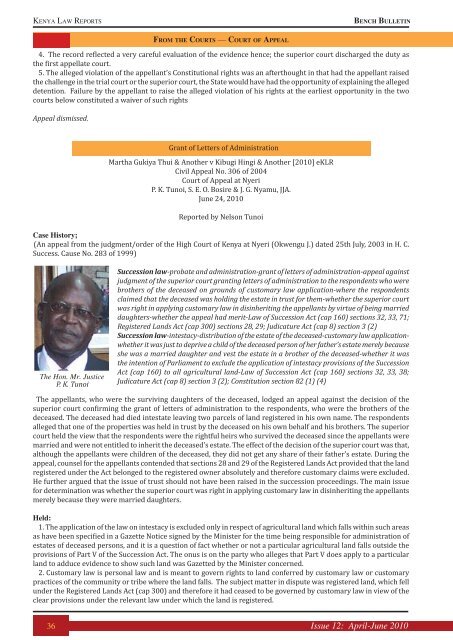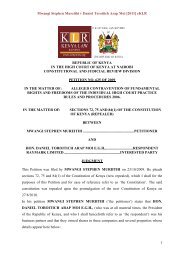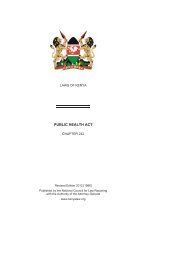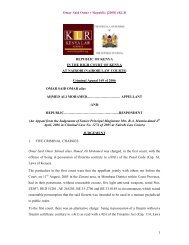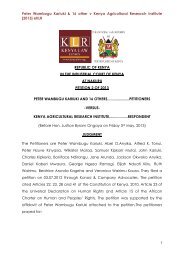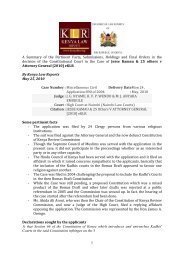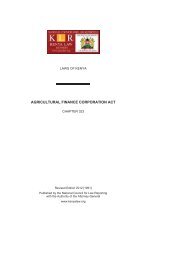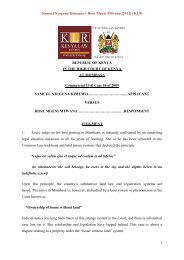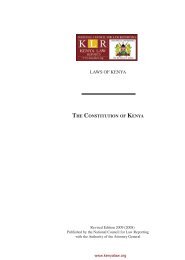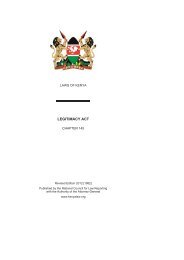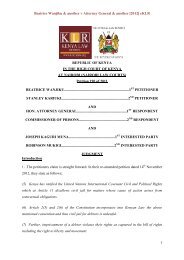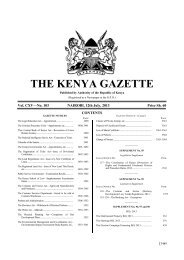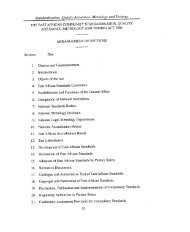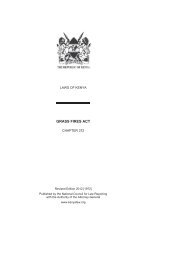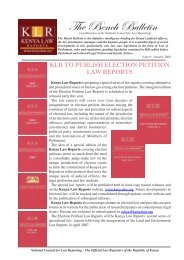Bench Bulletin - Issue 12 - Kenya Law Reports
Bench Bulletin - Issue 12 - Kenya Law Reports
Bench Bulletin - Issue 12 - Kenya Law Reports
You also want an ePaper? Increase the reach of your titles
YUMPU automatically turns print PDFs into web optimized ePapers that Google loves.
KENYA LAW REPORTS<br />
BENCH BULLETIN<br />
FROM THE COURTS — COURT OF APPEAL<br />
4. The record reflected a very careful evaluation of the evidence hence; the superior court discharged the duty as<br />
the first appellate court.<br />
5. The alleged violation of the appellant’s Constitutional rights was an afterthought in that had the appellant raised<br />
the challenge in the trial court or the superior court, the State would have had the opportunity of explaining the alleged<br />
detention. Failure by the appellant to raise the alleged violation of his rights at the earliest opportunity in the two<br />
courts below constituted a waiver of such rights<br />
Appeal dismissed.<br />
Grant of Letters of Administration<br />
Martha Gukiya Thui & Another v Kibugi Hingi & Another [2010] eKLR<br />
Civil Appeal No. 306 of 2004<br />
Court of Appeal at Nyeri<br />
P. K. Tunoi, S. E. O. Bosire & J. G. Nyamu, JJA.<br />
June 24, 2010<br />
Reported by Nelson Tunoi<br />
Case History;<br />
(An appeal from the judgment/order of the High Court of <strong>Kenya</strong> at Nyeri (Okwengu J.) dated 25th July, 2003 in H. C.<br />
Success. Cause No. 283 of 1999)<br />
The Hon. Mr. Justice<br />
P. K. Tunoi<br />
Succession law-probate and administration-grant of letters of administration-appeal against<br />
judgment of the superior court granting letters of administration to the respondents who were<br />
brothers of the deceased on grounds of customary law application-where the respondents<br />
claimed that the deceased was holding the estate in trust for them-whether the superior court<br />
was right in applying customary law in disinheriting the appellants by virtue of being married<br />
daughters-whether the appeal had merit-<strong>Law</strong> of Succession Act (cap 160) sections 32, 33, 71;<br />
Registered Lands Act (cap 300) sections 28, 29; Judicature Act (cap 8) section 3 (2)<br />
Succession law-intestacy-distribution of the estate of the deceased-customary law applicationwhether<br />
it was just to deprive a child of the deceased person of her father’s estate merely because<br />
she was a married daughter and vest the estate in a brother of the deceased-whether it was<br />
the intention of Parliament to exclude the application of intestacy provisions of the Succession<br />
Act (cap 160) to all agricultural land-<strong>Law</strong> of Succession Act (cap 160) sections 32, 33, 38;<br />
Judicature Act (cap 8) section 3 (2); Constitution section 82 (1) (4)<br />
The appellants, who were the surviving daughters of the deceased, lodged an appeal against the decision of the<br />
superior court confirming the grant of letters of administration to the respondents, who were the brothers of the<br />
deceased. The deceased had died intestate leaving two parcels of land registered in his own name. The respondents<br />
alleged that one of the properties was held in trust by the deceased on his own behalf and his brothers. The superior<br />
court held the view that the respondents were the rightful heirs who survived the deceased since the appellants were<br />
married and were not entitled to inherit the deceased’s estate. The effect of the decision of the superior court was that,<br />
although the appellants were children of the deceased, they did not get any share of their father’s estate. During the<br />
appeal, counsel for the appellants contended that sections 28 and 29 of the Registered Lands Act provided that the land<br />
registered under the Act belonged to the registered owner absolutely and therefore customary claims were excluded.<br />
He further argued that the issue of trust should not have been raised in the succession proceedings. The main issue<br />
for determination was whether the superior court was right in applying customary law in disinheriting the appellants<br />
merely because they were married daughters.<br />
Held:<br />
1. The application of the law on intestacy is excluded only in respect of agricultural land which falls within such areas<br />
as have been specified in a Gazette Notice signed by the Minister for the time being responsible for administration of<br />
estates of deceased persons, and it is a question of fact whether or not a particular agricultural land falls outside the<br />
provisions of Part V of the Succession Act. The onus is on the party who alleges that Part V does apply to a particular<br />
land to adduce evidence to show such land was Gazetted by the Minister concerned.<br />
2. Customary law is personal law and is meant to govern rights to land conferred by customary law or customary<br />
practices of the community or tribe where the land falls. The subject matter in dispute was registered land, which fell<br />
under the Registered Lands Act (cap 300) and therefore it had ceased to be governed by customary law in view of the<br />
clear provisions under the relevant law under which the land is registered.<br />
36<br />
<strong>Issue</strong> <strong>12</strong>: April-June 2010


